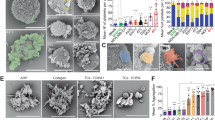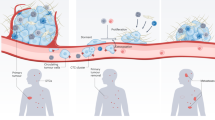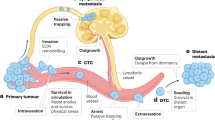Abstract
Selective metastasis of malignant cells in various neoplastic processes is poorly understood. Metastasis seems to be associated with inherent biochemical and biological properties of tumour cells which guarantee their survival and multiplication. These properties may include surface enzymes1, interaction with various host defence systems and cells2–4, combination with host platelets5, or with the host endothelial cells, and adhesiveness of the metastatic cell. Fidler2,6,7 has developed a series of malignant melanoma cells that are useful for studying tumour metastasis. By comparing the moderate metastatic parent line, B16F1 to the highly metastatic Une, B16F10, it is possible to study metastasis selectively. Prostaglandins influence various cell functions, and may be involved in regulation of neoplastic processes8–10. We have recently reported that prostaglandin D2 (PGD2) formation by malignant melanoma cells in vitro is inversely correlated with their metastatic potential11. The studies we describe here were designed to determine whether treating the cells with a cyclooxygenase inhibitor, which would block conversion of arachidonic acid to prostaglandins, would affect the metastatic rate of either cell. The results suggest that PGD2 is involved in the metastasis of these cells.
This is a preview of subscription content, access via your institution
Access options
Subscribe to this journal
Receive 51 print issues and online access
$199.00 per year
only $3.90 per issue
Buy this article
- Purchase on Springer Link
- Instant access to full article PDF
Prices may be subject to local taxes which are calculated during checkout
Similar content being viewed by others
References
Bosmann, H., et al. Nature 246, 487 (1973).
Fidler, I. Cancer Res. 34, 491 (1974).
Fidler, I., Gersten, D. & Budman, M. Cancer Res. 36, 3160 (1976).
Fidler, I. Cancer Res. 34, 1074 (1974).
Gasic, G., Gasic, T., Galanti, N., Johnson, T. & Murphy, S. Int. J. Cancer Res. 11, 704 (1973).
Fidler, I. Nature new Biol. 242, 148 (1973).
Fidler, I. Cancer Res. 35, 218 (1975).
Wood, S. & Hilgard, P. Lancet ii, 1416 (1972).
Powles, T. J., Easty, G. C., Easty, D. M. & Neville, A. M. Lancet ii, 100 (1973).
Kibbey, W. E., Brown, D. G. & Minton, J. P. Lancet ii, 101 (1978).
Fitzpatrick, F. A. & Stringfellow, D. A. Proc. natn. Acad. Sci. U.S.A. 76, 1765 (1979).
Lands, W. E. M., LeTellier, P., Rome, L. & J. Adv. Bioscience 9, 15 (1973).
Smith, J., Silver, M., Ingerman, C. & Kocsis, J. Thromb. Res. 5, 291 (1976).
Nishizawa, E. et al. Prostaglandins 9, 109 (1975).
Author information
Authors and Affiliations
Rights and permissions
About this article
Cite this article
Stringfellow, D., Fitzpatrick, F. Prostaglandin D2 controls pulmonary metastasis of malignant melanoma cells. Nature 282, 76–78 (1979). https://doi.org/10.1038/282076a0
Received:
Accepted:
Issue Date:
DOI: https://doi.org/10.1038/282076a0
This article is cited by
-
Inhibitory effects of prostaglandin D2 against the proliferation of human colon cancer cell lines and hepatic metastasis from colorectal cancer
Surgery Today (1998)
-
Prevention of experimental hepatic metastasis with thromboxne synthase inhibitor
Research in Experimental Medicine (1995)
-
Review perspectives in the treatment of cancer metastasis
Clinical & Experimental Metastasis (1987)
-
Arachidonic acid metabolic profiles in human meningiomas and gliomas
Journal of Neuro-Oncology (1987)
Comments
By submitting a comment you agree to abide by our Terms and Community Guidelines. If you find something abusive or that does not comply with our terms or guidelines please flag it as inappropriate.



